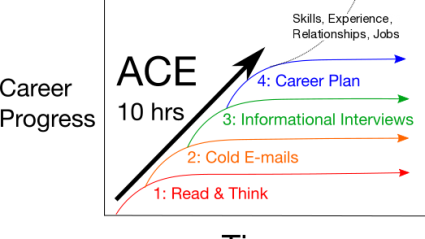During a recent OITE workshop on the topic of career planning, trainees from all levels described finding the job search process “scary” and had feelings of fear and stress regarding approaching the next steps.

Many of our NIH post bacs, postdocs and graduate students ask the question, “What can I expect from my counseling or advising meeting?” To answer this question fully is to realize that the route to having successful counseling and advising sessions, like any relationship, is a two-way street.

Two of the most frequent questions that fellows ask during career counseling are, “For what jobs do I qualify? “or “Should I apply for this job?”. To answer these questions, career counselors begin with helping fellows to identify and speak assertively about career from their career trajectory that are factual and grounded in reality.
The Office of Intramural Training and Education (OITE) of the NIH extends a warm welcome to the Summer 2017 interns. Over the next few months, you will engage in many unique opportunities in biomedical research that will encourage you to consider pursuing careers and further graduate study in the field. As you are settling in to your lab and meeting your PIs and fellow trainees, we want to make sure that you are aware of a variety of helpful blog posts that will help you to maximize your summer experience.
On May 11, 2017 the OITE will again host the NIH Career Symposium! This year is special…we will celebrate its 10th anniversary. This event is one of our favorites, it highlights the multitude of career opportunities for biomedical scientists—and in the past decade over 7500 graduate students, postdocs and fellows have attended the event to propel their own careers. Our invited speakers tell us about their career paths, how they got their jobs, and advice to attendees as they plan their careers.
One of the most important criteria to consider during the job, graduate school, or Postdoc search is to learn about the culture of the place where you are applying. This means to gather information about the employee’s opinions of the work environment, the support and benefits that they receive, and the values that drive the organization. This is important because you will work and /or study in this environment for many years and you want to find a good fit for your interests and personal style. But how do you assess this when you are applying?
One of the most challenging questions that developing scientists must answer is, “Should I pursue an academic or industry career?” For some, the pursuit of an academic career is their path of choice.
Managing transitions is an issue that you will likely face throughout your career. Many PhDs choose to leave the bench to work in an office. While some things stay the same no matter where you work, some of the cultural changes that accompany a desk job may be surprising. Here are some identified by members of the Office of Intramural Training and Education (OITE):

Have you ever taken the Myers Briggs Type Indicator (MBTI)? If so, you know that this is an assessment with the aim of measuring your personality preferences along four different dichotomous dimensions. The MBTI helps people answer the following questions: Where do you focus your attention and/or get your energy?; How do you prefer to take in information?; How do you make decisions?; and finally, How do you organize the world around you?


